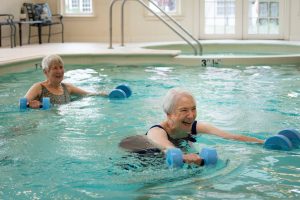
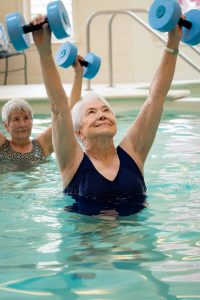


The Cedars is pleased to be the recipient of The Age friendly Health Systems award.
Recognized as a leader in the rapidly growing movement committed to care for older adults that is:
· Guided by an essential set of age friendly evidence-based practices across the 4 M’s (What Matters, Medication, Mentation, and Mobility).
· Causes no harm and is consistent with What Matters to the older adult and their family.
The Cedars continues its 93- year commitment and legacy of providing outstanding care for older adults.
We are excited to be part of a nationwide movement to improve health care for older adults.
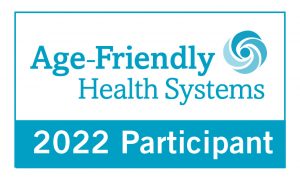
Age-Friendly Health Systems is an initiative of The John A. Hartford Foundation and the Institute for Healthcare Improvement in partnership with the American Hospital Association and the Catholic Health Association of the United States.
 When you think of senior living communities, do you imagine playing bingo all day? Think again! From day trips to exciting destinations around southern Maine to sensory gardening, reiki massage, and wine and cheese parties, The Cedars finds fresh ways to keep older adults active, engaged, and connected to each other and the world.
When you think of senior living communities, do you imagine playing bingo all day? Think again! From day trips to exciting destinations around southern Maine to sensory gardening, reiki massage, and wine and cheese parties, The Cedars finds fresh ways to keep older adults active, engaged, and connected to each other and the world.
Yes, you can join a rollicking bingo game at The Cedars, (Free Money Monday Bingo is cutthroat competitive, so bring your game face!) But activities for seniors at The Cedars go far beyond bingo. Our life enrichment team fills our assisted living activities calendar with vibrant, diverse, and lively opportunities to socialize with others, learn new skills and find new passions, improve health and cognitive functioning, experience the natural world, and make meaningful contributions to the wider community.
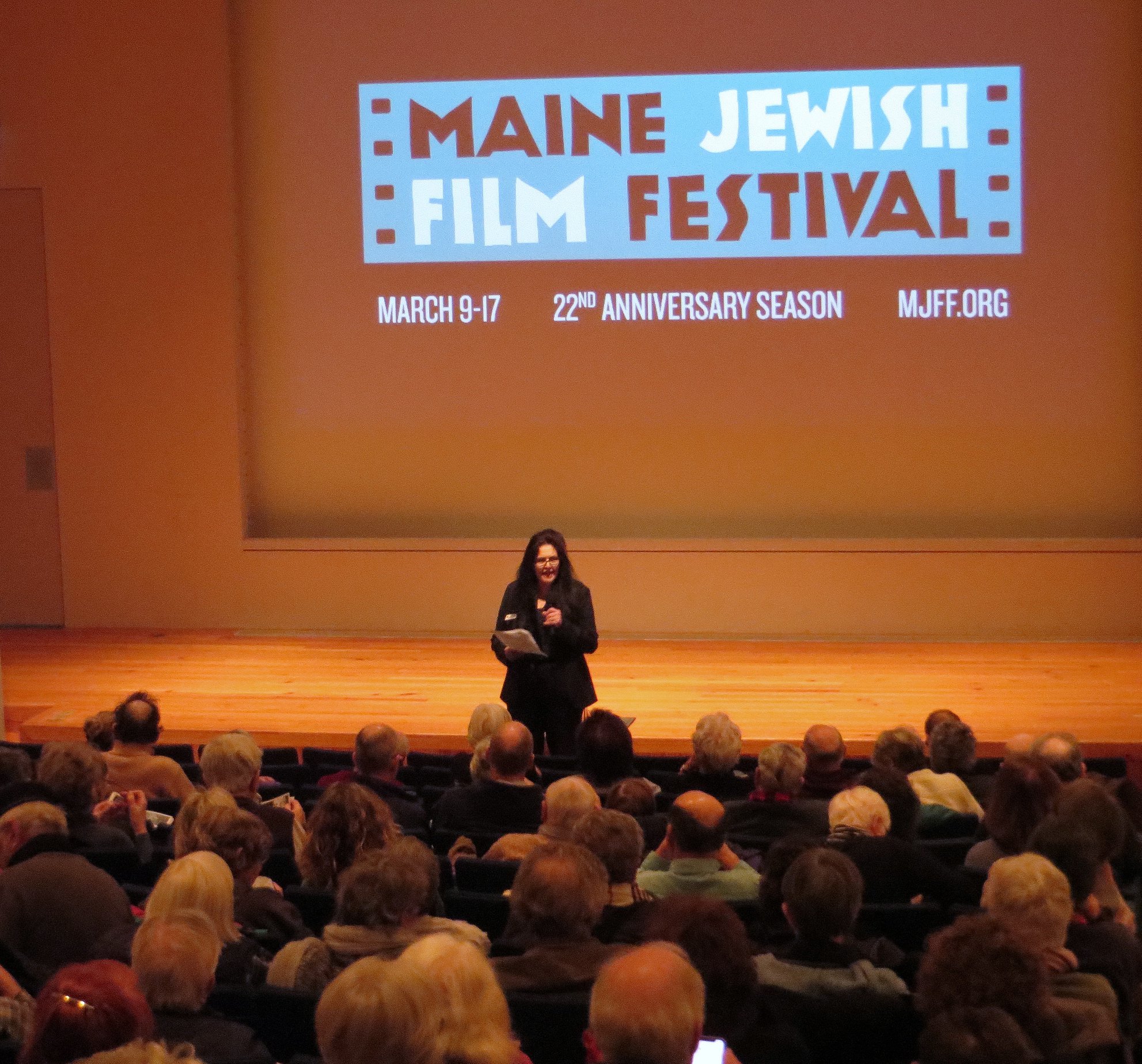 Here are just some of the unexpected and innovative ways our residents make the most of this exciting chapter in their lives.
Here are just some of the unexpected and innovative ways our residents make the most of this exciting chapter in their lives.
Finding Your Inner Artist
Crafts for senior citizens at The Cedars include sewing, knitting, flower arranging, card making, holiday decorating, baking, watercolor painting, and many more. Our residents bring so much rich knowledge of handicrafts and exceptional creative talent to our community and are so eager to share it with others.
On any given day, you can find residents knitting hats for cancer patients or making a baby quilt for a new grandchild. Creating stunning floral arrangements to decorate our common living areas or a unique card to commemorate a loved one’s special day. Capturing Maine’s changing seasons or a treasured memory in a lovely photograph, drawing, or painting. Learning a tricky new recipe from one of our talented chefs during a cooking class or decorating sugar cookies for a holiday party.
Freed from housekeeping responsibilities and able to request the help they need with activities of daily living, our assisted living residents have the time, energy, and creativity to express themselves in so many different mediums while enjoying all the benefits of cognitive art therapy.
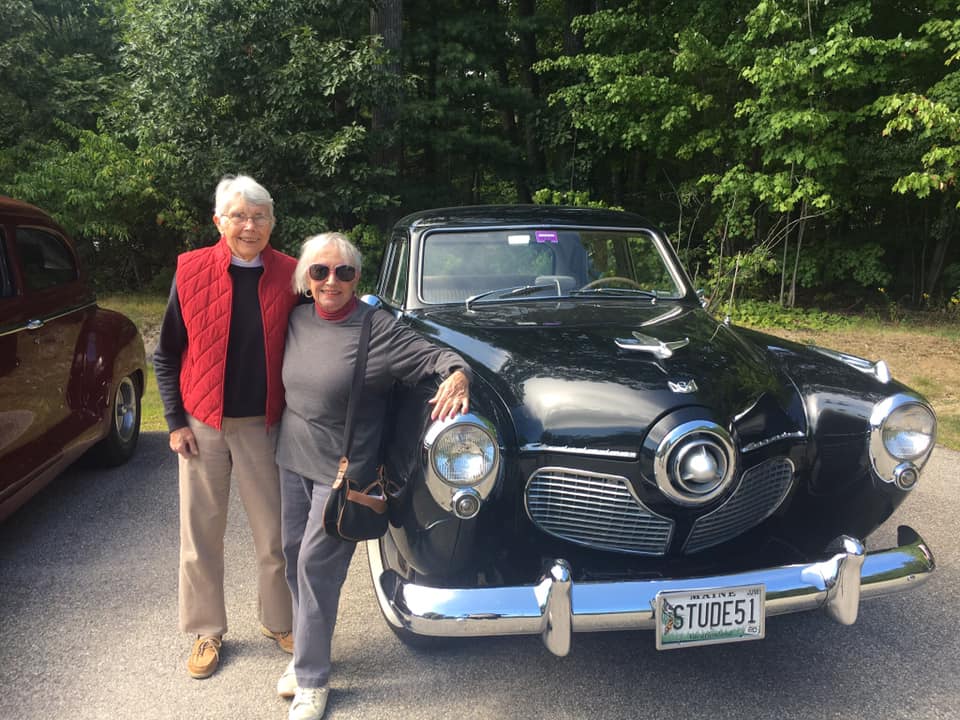 Group Trips with Friends
Group Trips with Friends
Residents at The Cedars take full advantage of our amazing location in the heart of Maine’s largest city, close to the glories of the rocky coast. They hop ferries to Casco Bay islands, enjoy and ice cream after touring lighthouses, go apple picking at local farms and stock up on cider and donuts for the ride home. They enjoy meals at the region’s top-rated restaurants or tuck into Pier Fries by the sand and surf of Old Orchard Beach.
Lifelong learners, our residents travel together to take OLLI courses at the University of Southern Maine or take in the latest gallery opening at the Portland Museum of Art. They attend live theater performances, world-class classical concerts, and dance or tap their feet to swing and jazz bands while sampling artisan wines and cheeses.
The Cedar’s attentive staff and safe transportation options set our residents free to explore to their heart’s content, enjoying the fresh air, community connections, all the benefits of art and music therapy, and a limitless sense of possibility.
Getting Outside and Enjoying the Fresh Air
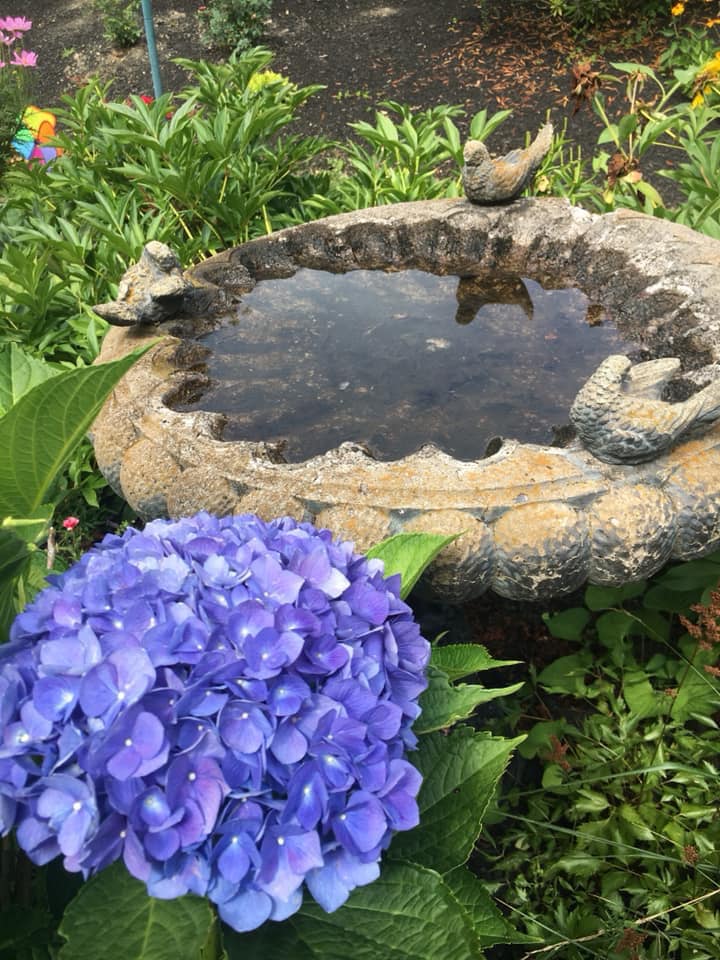
Sensory garden ideas for adults unlock the calming, healing powers of nature, and The Cedars makes sure our residents can fully experience the glories of Maine’s changing seasons.
From shady patios cooled by sparkling fountains to our warm, glowing greenhouse to carefully cultivated sensory gardens offering a dazzling array of colors, textures, and aromas, our residents are never far from
nature. Residents help us choose and tend plantings around our campus and comfortably cultivate our elevated garden beds. The greenhouse is a particularly popular place to spend time during Maine’s cold winters, breathing in the scents of warm earth and budding flowers. And our sunporches and patio tables are regular gathering places for al fresco dining or chatting over a cup of coffee or tea.
And it isn’t all quiet and meditative contemplation! Our adventurous residents take long rambles along our many nature paths—and even take fitness classes that supplement these walks with cardiovascular exercises and cognitive challenges. They sign up for thrilling bike rides with the Portland Wheelers. They indulge their inner child with water balloon tosses and lawn games and challenge each other on the putting green. And they enjoy garden tours, area flower shows, the annual Portland Museum of Art flower show, and exploring the Coastal Maine Botanical Gardens.
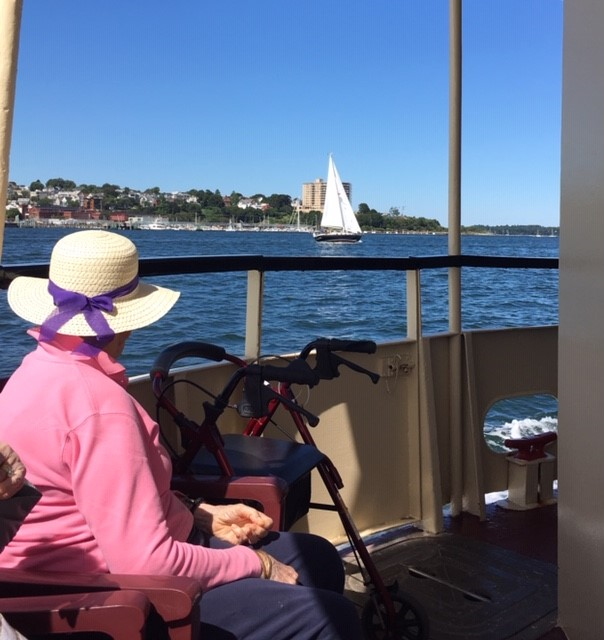
Maine is known for its stunning, unspoiled scenery, and The Cedars campus is a serene and green oasis within a vibrant city. We make it possible for our residents to have a strong connection to and appreciation for the natural world that truly enhances their lives.
Would you like to learn more about the many, MANY more recreational activities and learning, fitness, and entertainment opportunities assisted living at The Cedars provides? Talk to our senior living specialists at 207.221.7000 today.

The Cedars was selected out of many long-term care communities to participate in the Maine Dementia Care Partnership (MDCP) free, virtual education program, Addressing Root Causes of Cognitive Decline: A Guide to Preventing and Reducing Antipsychotics and How a New Maine Dementia Care Toolkit Can Help. Held on February 8 & 15, 2022, the program introduced the Partnership’s new resident-centered dementia care toolkit entitled “Is it for me, or for you?” Resident-Centered Dementia Care Toolkit .
The toolkit is the result of grant-funded work by Partnership members and clinicians, over the course of several months. It provides a conceptual framework, roadmap, and step-by-step guide to help nursing homes successfully reduce off-label antipsychotic drug use within their settings. It includes strategies for educating and collaborating with various constituencies, fostering community wide commitment to reducing A/P utilization, using data to inform decision making, developing dementia care competencies for staff, and identifying specific individuals for gradual dose reduction. The Cedars will be one of 40 nursing homes in a formalized effort to implement at least one toolkit item.
Angela Hunt, Chief Innovations Officer here at The Cedars and one of the many members and clinicians involved in the development of the toolkit, states that the “toolkit provides long-term care communities with a solid foundation on how to implement person-centered care practices and non-pharmacological approaches in support of dementia care.”
The Maine Dementia Care Partnership is very excited to kick off this initiative and offer the toolkit for free to Maine nursing care communities.
Strategies to Help Your Parents Feel at Home in a Retirement Community
Moving your parent(s) into a retirement community can be a very difficult process. We’ve met with hundreds of families and have put together some of the best tips we’ve seen for children to make the transition easier.
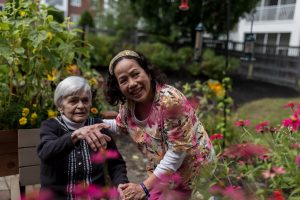
Your family worked together to help your aging parents make a big decision: moving into a retirement community, like assisted living or long- term skilled nursing care. Their lives are about to become safer, simpler, and more rewarding, and the transition to a retirement community does not need to be stressful. Our quick tips guide can get you started on moving elders with ease.
Yes, moving a parent to a retirement community is a big change—a change for the better. These benefits include more opportunities to socialize, make new friends and engage in meaningful activities, with caring supportive staff to assisting with activities of daily living, around-the-clock access to healthcare, nurses, CNA’s and much more. Your aging parents are about to start a wonderful new chapter of their lives and you will soon be able to breathe a big sigh of relief.
That said, change isn’t easy for any of us, and adjusting to a retirement community is a big change, and we all find change unsettling at first. How can you support your elderly parents as they make this transition?
Community
Many older adults avoid retirement communities even if they are struggling to age in place, because they associate care options such as long term skilled care and assisted living with social isolation. This style of living Is not lonely. It is not abandonment. It is exactly the opposite! Retirement living offers a welcoming community of older adults just like your parents, who now have the free time and support to make and socialize with new friends.
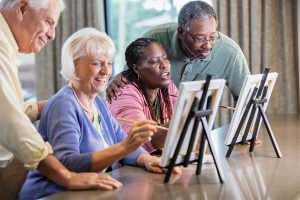
A new retirement community for elderly parents is a bit like starting a new job or a new school and first-day jitters are understandable. Acknowledge your parents fears about being lonely in their new home and listen sympathetically as they express them. Make it a priority to be close by during the first few days or weeks and reassure your parents that you will visit them frequently to help them settle in. Consider reaching out to their friends or neighbors and asking them to pop by to see the new apartment and admire the amenities. Encourage your parents to join group activities or sit with someone new in the dining room and send emails or texts throughout the day to ask how things are going.
If you can help them make this initial adjustment, your parents will soon be making connections and finding activities they enjoy. You might have a hard time keeping up with their busy social schedule!
Perspective
If your elderly parents express frustrations with a new environment, new routines, and new people, see if you can reframe their feelings in a more positive light. “The kitchenette in our apartment is so small” can be an opportunity to ask about the best new dish they’ve tried in the dining room, or how great it is to no longer need to do dishes or clean every night.
As they make new friends, try new activities, and start exploring their new community, celebrate these wins and talk openly about these improvements. Keeping small frustrations in perspective can really help improve their mindset.
Technology
Make sure they have access to a smartphone, tablet, or computer they feel comfortable using to stay organized, engaged, and connected. There are many easy-to-use devices that can make it easier for your elderly parents to remember important milestones or routines, track their medications and fitness goals, participate in remote gatherings and family group chats, and more. Not sure which type of tech makes the most sense? The Cedars has a great guide on how the latest technology can keep older adults connected to their families and their communities.
Routines
Familiar routines are very reassuring for everyone, and the move to retirement community living for elderly parents disrupts the rhythms of the day. Once your parents have moved in, however, they can begin re-establishing (or reinventing) their routines.
At The Cedars, our passionate care team practices true person-centered care, and every resident can choose when they wake up, when they go to bed, and what they do with the time between. As your parents make choices about how they wish to spend their days, encourage them to keep meaningful rituals and activities—a cup of coffee while reading the morning news, an afternoon walk, a weekly phone call with loved ones, tea and cookies before bed—while adding new, fun, and engaging elements to their daily lives.
Now that your parents have more free time and support, they can pursue favorite hobbies, learn new skills, make new friends, join new groups, and try new things.

Home
Believe it or not, at some point soon after moving into their new community, It will start to feel just like home! The Cedars strives to create a home like atmosphere with cozy and private living spaces and staff who truly care like family.
Not sure how to help move your parent into a retirement community where they can thrive? The Cedars can help. Call 207.221.7000 to speak to a senior living specialist today.
There are many resources on transitioning to a retirement lifestyle, but sorting through them can be overwhelming. We’ve compiled our favorite books on retirement living to make it easier for you to get important information you can trust.
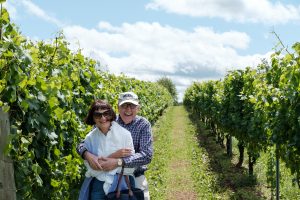
Retirement planning books, books on aging parents, and guides to retirement living are everywhere. How do you sort through them all to find a book that can speak to the challenges you and your loved ones are facing? Our senior living professionals here at The Cedars have compiled their favorite books on how to prepare for retirement and adjusting to assisted living so you can find retirement resources you can trust.
Are your parents thinking about retirement or moving into assisted living—or avoiding thinking about these steps? Are you and your siblings struggling to start important conversations or finding you can’t agree among yourselves? These life changes are not easy, and you are not alone. As retirees make up more and more of Maine’s population, more grown children find themselves worrying, planning, and stepping in to assist their parents with big decisions about this next chapter of their lives.
A good book can help guide you through the journey ahead.
A Bittersweet Season by Jane Gross
Author Jane Gross did not expect to find herself caring for her 85-year-old mother. The role reversal between being parent and child was lifechanging, emotional, so difficult, and so rewarding. Learning as she went, she gathered critical insight and deep wisdom during her journey that will help and comfort anyone walking the same path today.
From finding and moving her mother into an assisted living facility to figuring out how to finance the move to balancing the needs of her own family with her mother’s, Jane Gross navigated a sea change in her family life and her book can help your family chart your own course.
Navigating Assisted Living by Kristi Stalder
If you and your family are just beginning to have conversations about assisted living, Navigating Assisted Living can get you up to speed on what to expect, what your options are, and how to make your way through what lies ahead.
In simple, non-medical language, Kristi Stalder shows you how to start and hold hard conversations successfully. What to ask when you tour a senior living facility. How to understand the relationship between Medicare and Medicaid, how to see the warning signs of a decline in mental or physical health, and how to find the right level of care for someone you love deeply.
How to Care for Aging Parents by Virginia Morris
Informally known as “the caregiver’s bible,” Virginia Morris’s smart, straightforward guide covers not just how to prepare for retirement and how to find the right kind of care for an aging parent, but the process of aging itself.
By walking you through what happens to the body in old age, she helps adult children understand the changes their parents are experiencing and empathize with the emotional and physical challenges they face while setting appropriate boundaries. She skillfully sets out respectful markers for when adult children should consider intervening in their parents’ lives. And because so many residents of The Cedars have family out-of-state, the chapter on “caregiving from a distance” has been particularly helpful for many in our community.
Being Mortal by Atul Gawande
Adult children who find themselves tasked with making healthcare decisions on behalf of incapacitated parents can find this to be an agonizing and harrowing experience if they have not discussed these issues with their parents first. But how do you start a conversation with your parents about death and dying?
Despite its title, this important book is not about death. It is a guide to living a good life—to the very end. Physician Atul Gawande draws on his learning and practice to reveal the limits of modern medicine and demonstrate how our anxieties about death can keep us from making the best decisions about how we live (or try to extend) our lives.
Residents at The Cedars have found this book so moving and illuminating they have held book clubs and discussions around it, so adult children may want to consider reading the book alongside their parents and checking in regularly to share the thoughts and learning it inspires.
Elderhood by Louise Aronson
What does it really mean to be “old”? For most of human history, it meant living to age 60. Today’s older adults can reasonably expect to live 30-40 years past that date, as elders. Yet most people claim to dread or fear becoming an elder, as if aging were a disease.
Louise Aronson, a Harvard-trained geriatrician, has cared for older adults for over 25 years and she is wonderful news for all of us: old age can be filled with hope, health, and humanity. If you and your parents are overwhelmed by the decisions you are making about their retirement living, medical care, finances, or futures, Elderhood can be a bracing reminder of all the sweetness and vitality that still lie ahead.
If you and your parents have started thinking about retirement planning or assisted living, spending some time in a senior living center can help dispel fears and inspire action. The Cedars staff would love to welcome you for a personal tour! Call 207.221.7000
There are so many benefits to senior learning programs, from improving memory to boosting health and fitness. Discover lifelong learning resources in our senior community.
Never Stop Learning! Four Ways Seniors Can Continue to Learn

Senior learning does not have to slow down. The popular belief that it becomes harder to learn new things as we grow older is not true. Recent scientific studies have shown that the human brain retains the ability to absorb new information as we age as long as we continue to challenge ourselves, mentally and physically. At The Cedars, we know there are big benefits to lifelong learning for seniors, and our senior learning programs are designed to keep our members and residents learning, growing, and thriving in their retirement.
When we were infants and school-age children, the whole world was new. Our eager minds soaked up all this new information like sponges. As we grow older and more experienced and our daily lives present us with fewer opportunities to acquire new information and skills, we may start to feel that we don’t pick things up as quickly as we once did or remember them as well.

According to current neurological research, though, this simply isn’t true. Often times we aren’t pushing our brains as much as we once did and because older adults already have a deep reservoir of accumulated knowledge, we process the information we learn differently as well. Our ability to multitask does seem to lessen as we age but our ability to make significant connections between different types of information improves—“the wisdom of old age.”
Senior learning is simply a different stage of lifelong learning. Preventing cognitive decline as we age takes effort, both mental and physical, but the benefits are unmistakable. The connection between our brains and our bodies is very real. By focusing on senior health and fitness, senior learning programs, and social activities for seniors, The Cedars community supports our members and residents as they continue to explore this wonderful chapter of their lives.
The Benefits of Lifelong Learning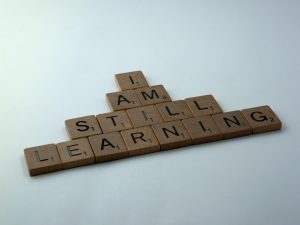
Strategies for Improving Memory
When we misplace our keys or can’t recall someone’s name, we may joke that we are having “ senior moment.” Our memory does not need to atrophy as we age as long as we care for it. According to recent scientific studies and books to improve memory, the keys to staying sharp as we age are:
Increasing Senior Health and Fitness
As you can see, learning in our later years starts with senior health and fitness. Studies have shown that exercise actually increases the size of the part of our brain tasked with memory and learning, even as we age.
Looking for senior fitness tips? Making regular movement and exercise part of your daily routine. The Cedars community makes it easy. Members of The Atrium have an indoor saltwater pool and jacuzzi with regular swimming and water aerobics classes. The Cedars community enjoys delicious, nourishing meals prepared from local ingredients in our fine dining rooms and cafes. There are weekly health and wellness classes, too—from chair yoga to tai chi to fall prevention. And outdoor activities for seniors, like our Cardio-Cognition class pairs brain challenges with brisk exercise to make the most of the mind-body connection.
Senior Learning Programs
Many studies of senior learning continue to show that if we push ourselves, our cognition will improve. A Scrabble game is a fun diversion but it will not provide the same memory and brain boost of auditing a college class. Older adults at The Cedars finally have the free time to pursue their interests and passions, and we make sure our community is filled with lifelong learning resources.

If you are curious about how life at The Cedars supports lifelong learning for seniors, call 207.221.7100 to speak to a senior living advisor today.
The last thing you want to worry about when adjusting to retirement living is money. Here, we will guide you to retirement planning resources and certified senior advisors to make your golden years stress free.
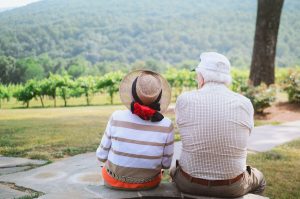
Planning for retirement means making sure you have the resources you need to secure the care and comfort you want. Depending on your expected MaineCare benefit, financing assisted living may take advanced planning. A certified senior advisor can help you forecast your assisted living costs and find financial freedom in retirement.
Understanding long term care expenses and assisted living costs in Maine can be complicated and confusing. The price of services varies greatly across the state and MaineCare Services covers very specific levels of care and services.
Whether you anticipate aging in place and accessing home care or moving into assisted living or memory care assisted living at some point in the future, life is unpredictable. If your health or plans change suddenly, you will want to have a firm financial plan in place so you can make the right choices for your health and your family’s wellbeing without financial worries.
Evaluating Your Long-Term Care Expenses
Even with access to MaineCare, the cost of long-term care may surprise you. Maine is the 8th most expensive state in America for nursing home care. The average cost of a nursing home in Maine is $271 per day, and those costs rise quickly if you plan to live in southern Maine and hope to have a private room. And while MaineCare may cover part of these expenses, it may not cover all of them.

Purchasing long-term care insurance and thinking about frugal retirement tips are a good start but for most of us, a financially secure retirement takes long-term planning and skilled professional financial assistance.
To truly evaluate your potential long-term care expenses, you’ll need to decide what really matters during retirement and what you feel you can compromise on. You’ll also need to consider your assets, like home(s) investments, and other insurance policies. Be aware of available services and their costs and research all available benefits and programs and start saving for your projected long-term care expenses as quickly as possible.
Finding a Financial Advisor for Seniors
At The Cedars, we see how a qualified financial advisor for seniors can help our members and residents enjoy the worry-free retirement they want and deserve. How can you find a certified senior financial advisor you can rely on?

Tax Deductions for Assisted Living Costs in Maine
Are assisted living expenses tax-deductible? It depends. In order to deduct those assisted living expenses that are needed for medical care, and if they have not been reimbursed by an insurance policy or any other program.
Retirement planning resources and advice can make it possible to achieve a worry-free retirement whenever you are ready. If you or your certified financial advisor would like to learn more about retirement living at The Cedars, call 207.221.7000 today.
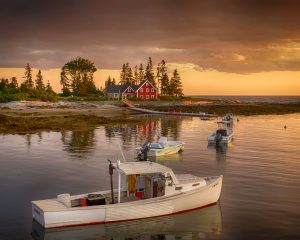
Maine is a very popular place for older adults to retire, consistently ranking at the top of national lists for affordability and livability. What draws seniors to Maine retirement communities and why should you consider retiring to Maine?
For many retirees, retiring in Maine means living a dream. Maybe they grew up here and moved away for work, counting down the days until they could retire and come home. Maybe they grew up vacationing in Maine, with fond memories of sleepaway camp or a family cottage or camping in the woods and promised themselves a time would come that they would never have to leave.
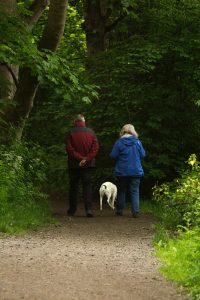
There are as many reasons to retire to Maine as there are older adults. It is no surprise that a state as stunning and welcoming as Vacationland would attract seniors ready to live a life they love. Maine tourist attractions are only part of the story, though. What are the top five reasons to consider retiring in Maine?
U.S. News and World Report estimates that retirees in Maine save hundreds of thousands of dollars over the course of an average retirement. And they save that money without compromising their quality of life. Housing costs, even in the current booming real estate market, can be bargains for older adults relocating from expensive, out-of-state locations. And Maine’s restaurant meals, cultural events, and recreational activities are all big city quality at small city—or small town—prices.
If you are curious about just how far your current income and assets can take you in a Maine retirement community, call the senior living experts at The Atrium.
Stellar arts organizations span the state, from the Farnsworth Art Museum in Rockland to the Haystack Mountain School of Crafts in Deer Isle to the legendary artist colonies of Monhegan Island. Residents at The Cedars, however, are minutes from Maine’s highest concentration of extraordinary arts venues. Portland, Maine arts attractions like the Portland Museum of Art, the Portland Symphony, Portland Stage Company, PORT Opera, and more are perhaps the best known and most beloved.
Maine also offers incredible concert venues, up-and-coming galleries, and regular and robust First Friday Art Walks—including regular exhibitions of work from The Cedars community. Portland, Maine retirement gives many members of The Atrium the chance to volunteer as docents and ushers at many venues across our vibrant arts scene.
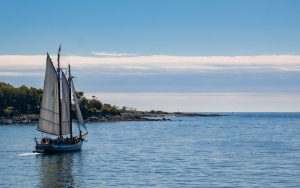
Access to nature is not the only thing Maine retirees enjoy. Portland tourist attractions include historic sites like the Portland Observatory, the Victoria Mansion, the Longfellow House, and of course the cobbled streets and charming shops of the historic Portland, Maine Old Port district. Residents of The Cedars particularly enjoy taking ferry rides with their friends to tour the Casco Bay Islands, spotting lighthouses and seals along the way.

Even retirees relocating from large, urban areas may find their restaurant choices upgraded upon arrival in Maine. And it isn’t all fine dining! Members of The Atrium love wandering the Farmers Market at Deering Oaks Park, seeking out new food trucks on the Eastern Promenade, trying all the treats at the Cumberland County Fair, and stopping at seafood shacks along the waterfront for an iconic lobster roll. One of our most popular senior outings at The Cedars every summer? Stopping at ice cream and frozen custard stands in scenic spots.
 Excellent Senior Health Care
Excellent Senior Health CareResidents of The Cedars retirement community have an additional layer of protection—24/7 access to medical care, with a highly trained staff of physicians, nurses, therapists, and CNAs. Our joint replacement program fast-tracks patients on the road to recovery. Members of The Atrium enjoy a saltwater pool and jacuzzi, and all residents of The Cedars benefit from easy access to wellness programming, fitness classes, nutritional support, and onsite specialist visits. We know the healthier you are, the more you will enjoy your retirement, and we want to see all Maine’s older adults thrive.
Exploring your options for retirement? Our award-winning Maine retirement community is a great place to start. Schedule your personal visit by calling our senior living advisors at 207.221.7000 today.
It’s tough to let go of your past, but many older adults find freedom to pursue new passions in transitioning to a retirement community. Here’s our guide to moving out of your home and into a retirement community.
Downsizing and Decluttering: Moving Out and Moving On

For most older adults, the decision to move to a retirement community means selling the family home and making tough decisions about which possessions they wish to keep and what should be sold, stored, or given away. Take a look at our moving tips for seniors and remember that letting go of the past will make room for the future!
Making the transition to a retirement community is a very big lifestyle change for most older adults. No matter how long you have lived within it, your family home is likely filled with precious memories, treasured objects and mementos, and a lot of clothing and furnishings.
Realizing you no longer need many (or most) of these possessions can be a very emotional process. The anxiety around downsizing and decluttering is very real. According to a recent study from Cornell University, clutter triggers the release of cortisol—a stress hormone—which can lead to increased tension, frustration, and unhealthy habits. If you feel your heart or breathing speeding up when you open your closets or pull out old storage boxes, this is a natural reaction to feeling responsible for a whole lot of stuff, particularly for women.
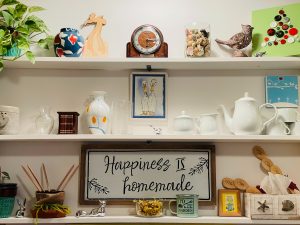
The best way to get back to feeling great about your future is to have less stuff from your past. Letting go of clutter will simplify your life, alleviate your stress, and let you move into this bright new chapter of your life without excess baggage.
Ask for—and Accept—Help With Downsizing and Decluttering
Not sure how to let go of material possessions? Unsure of where to start? Struggling to reach items in out-of-the-way places or to move bulky or heavy things? Ask for help.
Most older adults turn to their children and grandchildren for help packing to move. If your loved ones are also feeling emotional about your transitional planning and sentimental about letting go of the family home, however, it may be harder to make decisions you feel good about and move forward quickly.
Hiring a neutral third party, like a professional organizer, senior moving specialist, or estate liquidator, can make the process less fraught. They are not attached to your home or your belongings and they can have an easier time seeing what will be best for everyone involved. A good professional will spend time getting to know you and your goals for your move to assisted living and create a plan to get you there.
